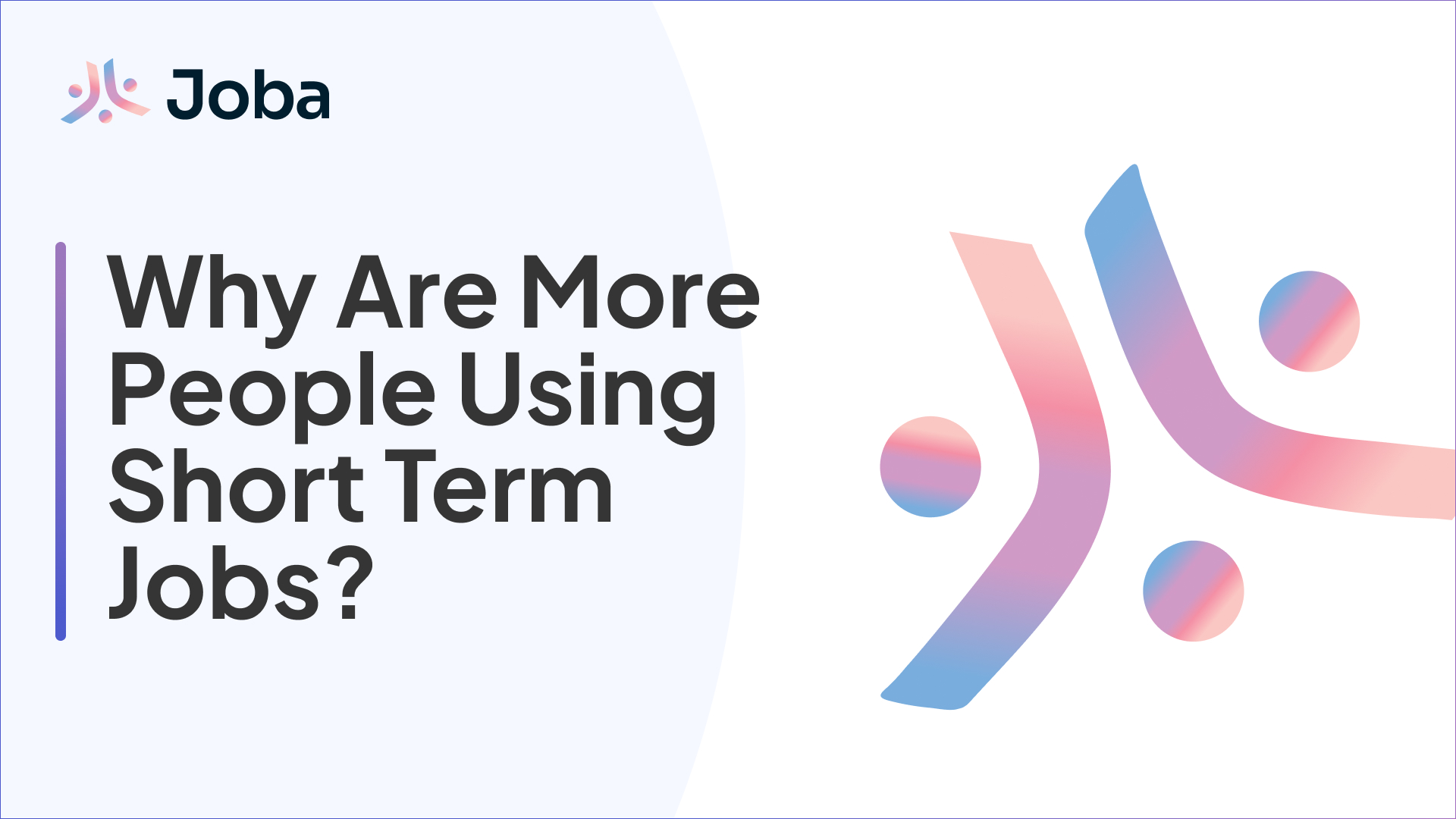Why More People Are Using Short-Term Jobs

In today's rapidly changing job landscape, the traditional concept of a long-term, 9-to-5 job is evolving. More and more people are choosing short-term jobs for various reasons. This shift is redefining the way we work, offering flexibility, diversity, and new opportunities. In this article, we'll delve into the reasons behind this trend, explore its benefits, and understand why it's becoming a preferred choice for many individuals.
The Rise of the Gig Economy
One of the primary driving forces behind the surge in short-term job preferences is the gig economy. This digital-age labor market allows individuals to take on short-term contracts, freelance work, or project-based assignments. The gig economy has gained immense popularity, offering a wide range of opportunities across various industries.
Flexibility is Key
Flexibility is a cornerstone of short-term jobs. People are increasingly valuing the ability to design their work around their lives, rather than the other way around. Short-term jobs allow for a more balanced work-life equation, accommodating side hustles, family responsibilities, and personal pursuits.
Skill Diversification
Short-term jobs provide a unique platform for skill diversification. Unlike traditional roles that often demand specialized skills, short-term work allows individuals to explore different industries and develop a broader skill set. This diversification can significantly enhance one's resume and open doors to new career paths.
Entrepreneurial Spirit
The gig economy attracts those with an entrepreneurial spirit. Freelancers, consultants, and short-term workers often enjoy the autonomy and freedom that come with their work. They have the opportunity to be their own bosses, set their rates, and choose the projects that align with their passions.
Testing the Waters
Short-term jobs serve as an excellent testing ground for individuals considering a career change. Whether you're thinking about switching industries or exploring a new role, taking on a short-term assignment allows you to dip your toes in the water without committing to a long-term career path.
Remote Work Revolution
The rise of remote work has further fueled the popularity of short-term jobs. With the digital landscape making it easier than ever to connect with employers and clients worldwide, many individuals are opting for remote short-term gigs that offer the freedom to work from anywhere.
Financial Freedom
Short-term work can also be financially rewarding. While some short-term positions may offer higher hourly rates or project-based pay, others provide the flexibility to earn additional income through multiple gigs or side projects. This financial freedom is an attractive aspect for many.
The Future of Work
As we move into the future, the way we work will continue to evolve. Short-term jobs are no longer a stopgap measure but a strategic career choice for those seeking balance, variety, and financial independence. The gig economy is here to stay, and short-term work will play a pivotal role in shaping the careers of many.
Embracing Change
In the face of uncertainty, short-term jobs offer individuals the chance to embrace change. They provide the flexibility to adapt to evolving job markets and industries. In an era where job security is no longer guaranteed, short-term positions offer a sense of empowerment, allowing individuals to take control of their careers.
Pursuing Passion Projects
Many short-term job enthusiasts use these opportunities to pursue their passion projects. Whether it's launching a startup, writing a novel, or creating art, short-term work provides the financial stability needed to chase one's dreams. It enables individuals to balance their creative pursuits with earning a living.
Avoiding Burnout
Long-term commitments can often lead to burnout. The pressure to excel in a single role for an extended period can take a toll on mental and physical health. Short-term jobs, on the other hand, offer the chance to take breaks between assignments, preventing burnout and promoting overall well-being.
Community and Networking
Short-term jobs can introduce individuals to a diverse range of people and industries. This networking opportunity can lead to unexpected career prospects, collaborations, and personal growth. The connections made in short-term roles can be invaluable for future endeavors.
An Evolving Definition of Success
Success in the modern workforce is no longer solely defined by climbing the corporate ladder or staying with a single company for decades. Short-term job enthusiasts often measure success by the variety of experiences, skills acquired, and the ability to lead a fulfilling, balanced life.
The trend of choosing short-term jobs reflects a broader shift in how we perceive work. It's not just about long-term commitments anymore; it's about creating a career path that aligns with individual goals and lifestyles. The gig economy offers a wealth of opportunities for those who value flexibility, skill development, and entrepreneurial ventures. Whether you're a freelancer, a consultant, or simply exploring your options, short-term jobs can be a stepping stone to a fulfilling and dynamic career journey.
In conclusion, the rise of short-term jobs is a testament to the adaptability of the modern workforce. It's a trend driven by the desire for flexibility, the pursuit of diverse skills, and the entrepreneurial spirit that defines our era. As short-term work continues to grow, individuals have the chance to craft careers uniquely tailored to their aspirations and ambitions. So, are you ready to embrace the world of short-term jobs? The future of work is in your hands.
Ready to explore exciting short-term job opportunities? Join Joba Network today and discover your next adventure in the world of work!
Frequently asked questions
No, some industries like health care and manufacturing require physical presence. But many fields, especially in tech and marketing, are well-suited for remote work.
Not necessarily. Many remote jobs offer competitive salaries and benefits.
There are various job boards dedicated to remote work, such as We Work Remotely and Remote OK.
The key is to set a routine, create a dedicated workspace, and use productivity tools to stay on track.
Tools like Slack, Zoom, and Asana are invaluable for remote work, aiding in communication and project management.




